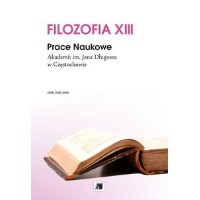Wątki nietzscheańskie w wybranych wierszach Herberta oraz w dramacie Jaskinia filozofów
Nietzsche’s Philosophical Concepts in Some Chosen Poems by Zbigniew Herbert and in His Drama Cave of Philosophers
Author(s): Halina Kozdęba-MurraySubject(s): Philosophy, Polish Literature
Published by: Uniwersytet Jana Długosza w Częstochowie
Keywords: nihilism; values; myth of eternal recurrence; idealism; Apollonian art;
Summary/Abstract: In his correspondence with prof. H. Elzenberg, Zbigniew Herbert mentioned his youthful fascination with the philosophy of F. Nietzsche on several occasions. The poet’s notes on this subject can also be found in the archives, containing a list of philosophical books, with which Herbert was well acquainted. What is common for both the poet and the German philosopher is their keen interest in pre-Socratic philosophy as well as their faithfulness to the earth, as opposed to Platonism, according to which the real world does not include what is hic et nunc. Quite like Nietzsche, Herbert claims that life in its diversity and changeability cannot be framed by means of abstract philosophical terminology. Nietzsche’s myth of “eternal recurrence”, the meaning of courage in human life, along with the question of values, following God’s death, are all issues noticeably present in both Herbert’s poetry and his drama Cave of Philosophers. The latter includes numerous allusions to Nietzsche’s works such as The Birth of Tragedy, or Thus Spoke Zarathustra. Herbert’s Socrates, however, challenges Nietzscheanism when it comes to the question of objectively existing values, independent of man’s subjective choice and his individual “will to power”. Herbert, quite like his mentor – prof. Elzenberg does not consider nihilism to be a starting point for creating new values but he rather attempts to revive ancient ones, which are grounded in the European culture and tradition
Journal: Prace Naukowe Akademii im. Jana Długosza w Częstochowie. Filozofia
- Issue Year: XIII/2016
- Issue No: 13
- Page Range: 97-113
- Page Count: 17
- Language: Polish

